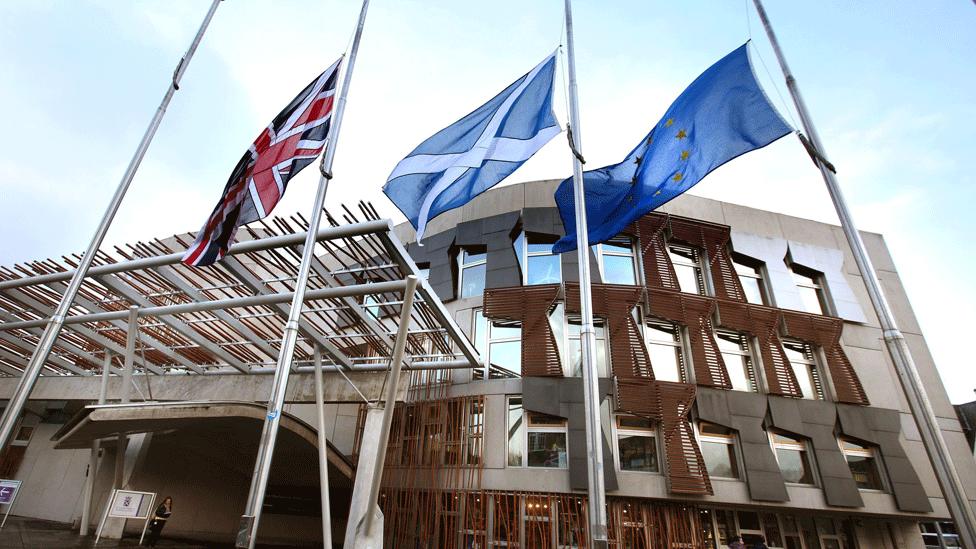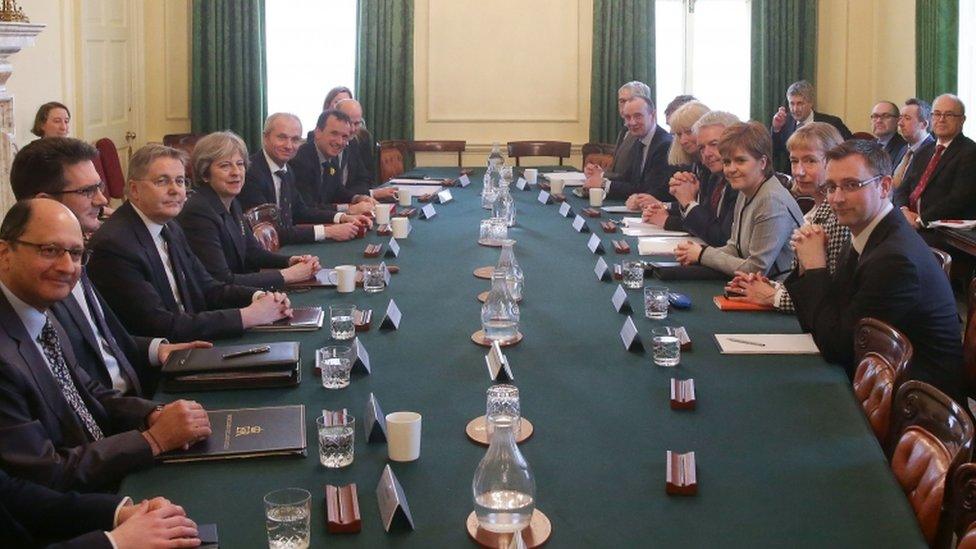Brexit dance continues during Europe Day celebrations
- Published

MSP Stuart McMillan piped Ode to Joy at the Europe Day rally in Glasgow
Happy Europe Day. Yes, I know, slightly incongruous, in this pre-Brexit period. Nevertheless, European links were marked and celebrated in Glasgow's George Square, with only a faint sense of the surreal.
There were stalls. There were banners. MSP Stuart McMillan played Beethoven's Ode to Joy, the European anthem. On the bagpipes.
Skilled piper that he is - he regularly plays at Holyrood events - Stuart contrived to retain the uplift of the original, with a slight added tone of lingering lament.
The last such day before Brexit - but, according to Fiona Hyslop, the Scottish minister who attended, emphatically not the last Europe Day. Scotland, she insisted, would continue to build and sustain links with European neighbours.
Which brings me to the practical implementation of Brexit. As they sang and celebrated in Glasgow, at Holyrood and Westminster a grim gavotte of constitutional politics is still under way.
Next week brings the third reading of the EU Withdrawal Bill in the Lords. Then the questions begin again. Will the UK government's defeats in the upper house - on key issues such as the customs union and the single market - be reversed in the commons?
And, for Scotland, what will happen to the return of EU powers in devolved areas? It is argued that next week's Lords reading is the last chance to resolve that issue.
In which regard, Holyrood will have to debate and vote upon a legislative consent motion before that Lords session takes place.

And there is still no deal on those powers. Hence no consent. UK ministers say 24 powers in key areas such as farm subsidies must be retained pro tem at Westminster to allow the preparation of UK frameworks, replacing EU rules.
Scottish ministers say it is an unwarranted power grab. UK ministers say they have made concessions: that Wales has agreed. Scottish ministers say: not sufficient, no deal.
Scottish Conservatives say SNP ministers are at it: that they are picking a fight to build support for independence. SNP ministers say they are defending Scotland's devolved interests.
So where are we? The finance and constitution committee at Holyrood has been considering the issue and has discussed its opinion, which will be published later this week.
However, it is my understanding that a majority on the committee will say that the current deal on offer from the UK government is still not good enough.
The Conservatives on the committee have professed themselves satisfied with the compromise on offer - and have voted to accept the deal.
But I understand the Greens and, crucially, Labour have voted with the SNP to argue that the deal still falls short. Labour's position reflects realpolitik in Scotland, rather than the party's more co-operative stance at Westminster.

There have been many meetings, but Scottish and UK ministers remain some distance apart
And the Scottish government? I now expect Scottish ministers to table a legislative consent motion for debate next week which reflects those developments and the state of negotiations with the UK government.
I expect it to be a motion for partial consent, reserving Holyrood's position on Clause 11 and Schedule 3 which deal with those powers returning in devolved areas.
If you think about it, that involves for Scottish ministers an implicit, even an explicit, acceptance that the UK government has a mandate to proceed with EU withdrawal.
But, of course, that caveat is crucial. Partial consent is just that. It is not unalloyed consent. It is not agreement. UK ministers will not regard it as acceptable.
In particular, they will not be content with the argument that Scotland can rely upon the continuity bill at Holyrood to keep legal provision in place in returning EU powers. Indeed, they are challenging that bill in the UK Supreme Court.
Which leaves us where? Either there will be a last minute deal - which neither side is presently forecasting. Or Westminster will legislate for EU Withdrawal without full Holyrood consent.
Which brings a new controversy altogether.